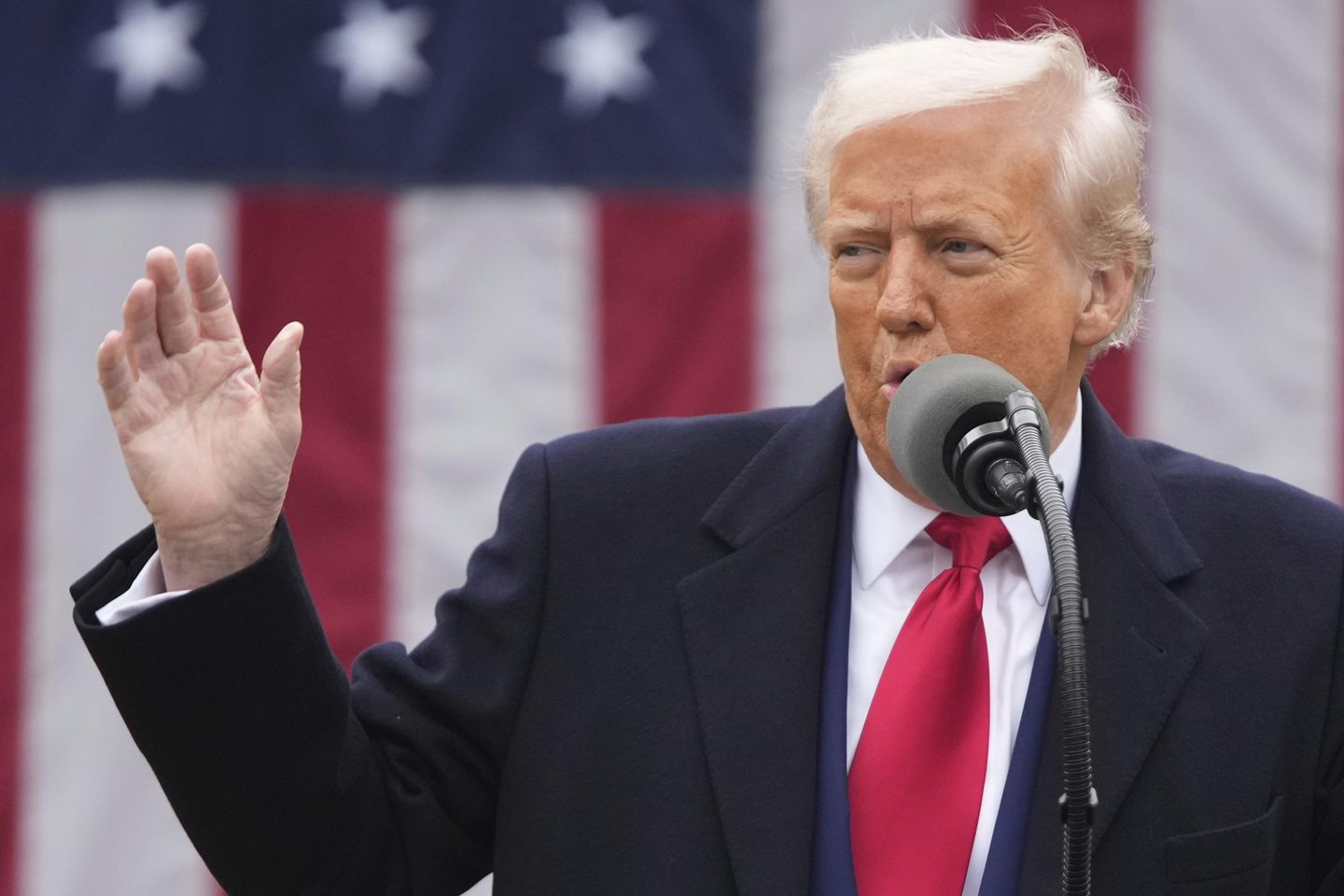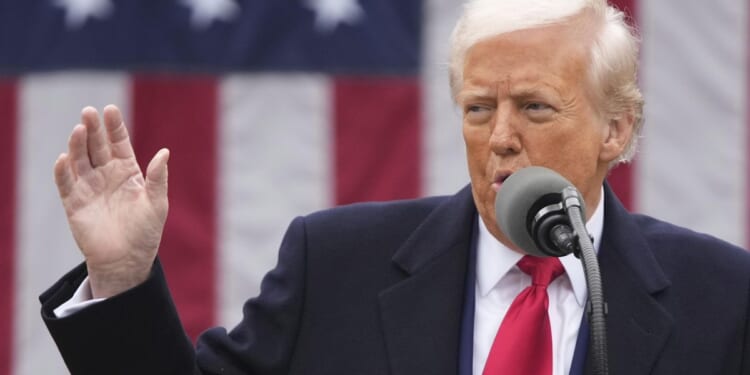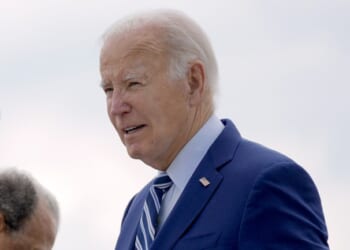
Wall Street stocks cratered and global leaders on Thursday condemned President Trump’s new tariffs as “brutal and unfounded” as the White House stood behind its plan to tax imports across the board.
French President Emmanuel Macron urged European nations to work together in fighting the tariffs and urged companies to pause investments in the U.S.
“The American economy and Americans will come out weaker and poorer,” he said.
Congressional lawmakers floated legislation to reclaim power over tariffs from the executive branch, and companies with extensive supply chains in hard-hit Vietnam and other Asian countries watched their stocks tick downward.
The Trump administration waved off the backlash, saying it had Main Street and blue-collar workers in mind as it imposed a 10% baseline tariff on all imports, plus higher, reciprocal levies on dozens of nations that impose expensive levies or other barriers on U.S. goods entering their countries.
Tariffs on cars that aren’t made in the U.S. went into effect, although copper, pharmaceuticals, semiconductors, lumber articles, certain critical minerals and energy products were exempted from the new plan.
SEE ALSO: Markets nosedive as investors digest Trump tariff plan; Dow drops 1,200 points
“This is a big change. I’m not going to shy away from it, but we needed a big change,” Vice President J.D. Vance told “Fox & Friends.”
Responding to fear of price shocks, Mr. Vance said Mr. Trump is correcting a “globalist” economy that put elites and other nations ahead of American workers, who saw their manufacturing jobs dry up.
“You don’t fix that stuff overnight,” the vice president said. “We know people are struggling. We’re fighting as quickly as we can to fix what was left to us, but it’s not going to happen immediately.”
Agriculture Secretary Brooke Rollins, speaking to White House reporters, said there “will be a short time of uncertainty, and then we’ll move back to the prosperity that this president has envisioned.”
While long-term results remain uncertain, the near-term reaction was loud and clear.
The Dow Jones Industrial Average and other major indexes dived while online sleuths questioned the underpinning of the tariff rates, saying they appeared to be calculated by looking at trade imbalances between the U.S. and other nations, not the tariff amounts or trade barriers imposed by those nations.
Tariffs are a tax or duty paid by importers on the goods they bring in from foreign markets. Mr. Trump says tariffs are a great way to force companies to return to America or keep their operations in the U.S., employ American workers and create revenue to fund domestic programs.
Foreign countries don’t pay the tariffs directly to the U.S. Treasury. In many cases, U.S. companies will pay the levies, and they might pass on at least some of the cost to consumers through higher prices.
Global trading partners unpacked the tariffs news with a mix of shock, confusion and indignation.
“To me, the U.S. President’s tariff decision is fundamentally wrong. This is a lose-lose situation for both — us and the United States,” German Chancellor Olaf Scholz said on X. “Germany and Europe stand for free trade, and we will defend our interests.”
Asian countries are hit particularly hard by the plan. China faces a 34% tariff, while Vietnam was listed at 46%, Japan at 24%, South Korea at 25%, India at 26% and Taiwan at 32%.
Companies, like Nike, with a large manufacturing base in Vietnam, will face headwinds, and Chinese goods face a combined 54% tariff because Mr. Trump added 20% levies earlier in his term.
Japanese Prime Minister Shigeru Ishiba said tariffs will have “a big negative impact on bilateral economic ties, the global economy and the multilateral trade system,” adding he “would not hesitate” to approach Mr. Trump in person.
Using language that is outspoken by Japanese standards, Mr. Ishiba said the tariffs were “extremely unfortunate” and “against our wish.”
Japanese media reported that Tokyo officials haven’t ruled out retaliation.
Calling tariffs “very grave,” acting South Korean President Han Duck-soo chaired an emergency meeting in Seoul with his finance and industry ministers, demanding the government use “all its capabilities” to “overcome this trade crisis.”
Some analysts believe Mr. Trump is using tariffs as leverage to get nations to reduce their tariffs or trade barriers against U.S. producers.
“I wouldn’t want to be the last country that tries to negotiate a trade deal with @realDonaldTrump,” Mr. Trump’s son Eric Trump posted on X. “The first to negotiate will win — the last will absolutely lose. I have seen this movie my entire life.”
Commerce Secretary Howard Lutnick, speaking on CNBC, said the administration isn’t looking to grant exemptions, saying the policy is a long-overdue restructuring of global trade to ensure fairness. At the same time, he said other countries might reexamine how they approach U.S. producers.
“I expect most countries to start to really examine their trade policy toward the United States of America and stop picking on us,” he said. “Stop saying that we can’t sell our corn to India, stop saying that we can’t sell our beef anywhere. Just stop treating us so poorly.”
On Capitol Hill, lawmakers responded with bipartisan legislation that would reassert Congress’ role over tariff authority.
The Trade Review Act of 2025 from Sens. Charles E. Grassley, Iowa Republican, and Maria Cantwell, Washington Democrat, would require Congress to pass a joint resolution of approval on new tariffs within 60 days, or else the levies would expire after that deadline.
In the meantime, Capitol Hill Democrats are questioning the ultimate goal of Mr. Trump’s latest tariffs.
“On one side, Donald Trump has hit Americans with a massive tax hike through his extremely dumb tariffs. On the other side, Senate Republicans are getting ready to take away vital programs, throw people off Medicaid, all so they can give massive tax breaks to billionaires,” Senate Minority Leader Charles E. Schumer, New York Democrat, said. “It’s a brutal Republican pincer move, with American families trapped in the middle.”
Sen. Chris Murphy, Connecticut Democrat, said Mr. Trump’s plan should not be viewed in economic terms at all. He said it amounts to a political tool to win loyalty from industrial sectors.
“Independent industry has power. The tariffs are Trump’s tool to erode that independence,” Mr. Murphy wrote on X. “Now, one by one, every industry or company will need to pledge loyalty to Trump in order to get sanctions relief.”
Industries signaled they were skittish about the fallout but were careful not to criticize the administration directly.
The American Apparel & Footwear Association warned that competing tariffs could snowball “into a growing, and potentially crushing, burden on American businesses and hardworking American families.”
“It is vital that our government’s actions be aligned so that they benefit both the crucial exports of American-grown and American-manufactured goods as well as U.S. imports of safe, affordable and innovative consumer products,” AAFA CEO Steve Lamar said.
The National Council of Textile Organizations, meanwhile, commended Mr. Trump for preserving duty-free trade on goods covered by the U.S.-Mexico-Canada Agreement that he negotiated in his first term and for closing the de minimis loophole that let Chinese producers send low-value packages straight to U.S. consumers.
“This loophole facilitates 4 million shipments a day to the United States that often hide illegal and unethically made products, unsafe goods and illicit fentanyl and other narcotics that reach our doorsteps,” NCTO CEO Kim Glas said. “Countries such as China currently avoid billions in U.S. duties through the use of de minimis to the United States.”
• Andrew Salmon contributed to this report.








